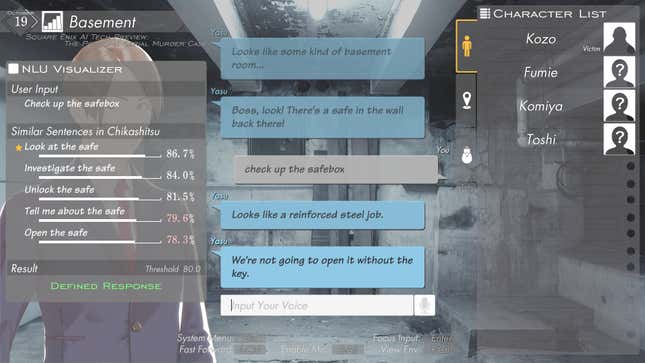
Square Enix, a publisher never afraid to embarrass itself with the latest technological fad, has quietly released an “AI-driven” game onto Steam. And it sucks.
Not the game itself! To say The Portopia Serial Murder Case is a bad game is unfair, because this 2023 experiment—a free download on Steam—is actually a remake of an adventure game first released in Japan in 1983, when “adventure game” meant “typing stuff into a computer”. And the quality of the game itself isn’t really up for discussion here.
What’s notable about this release is the fact Square Enix is using it as a testbed for “AI” tech in video games, and it has been an absolute disaster. While your first instinct might be to think that Square has used “AI” to generate dialogue or art, that’s actually not the case here; the publisher is instead using machine learning (which is what this actually is, not actual “artificial intelligence”) to help people play the game more easily.
As I’ve said, old text-based adventure games were a nightmare to both program and play because even if you knew—or thought you knew—the answer to a puzzle, its completion would be reliant on the user inputting the exact text required to progress. If you thought “kick door” would work, but the developers wanted you to “ram door”, then you’d be stuck.
This 2023 remake of The Portopia Serial Murder Case, on the other hand, is using Natural Language Processing (NLP) to try and link the player’s input to the correct or desired answer. Here’s an example of how it was supposed to work, showing how the NLP weighs up a user’s text input with similar sentences to help make this whole process easier.

Or at least, that was the idea. In practice, it just doesn’t work. The game’s reviews are about as bad as they could be, with users not just unhappy at the way a pioneering adventure game has been dug up as a showcase for machine learning, but the fact that the machine learning is broken, leaving players with text inputs that are just as frustrating—and in many cases more so—than the 1983 original.
Just an insult to a game with such an important legacy. It’s actually a marvel how this manages to be a failure on all fronts.
TL;DR: The AI on showcase is so unsophisticated that it can’t even discern that commands like “Go to study” and “Go to the study” are effectively the same. Even aside from the AI, the game lacks features that have been standard to Visual Novels for 20-30 years.
Zork (1977) had a better understanding of what your commands meant
...this software is meant to demonstrate the cutting edge technology of AI similar to chatGPT, but doesn’t even comes close to that. You have to be specific with what you type otherwise you’d get a response as “Hmm...” or” We should focus at the task at hand”. It’s quite odd suggesting that the reason of this software in the first place is to type out whatever we want to make choices (generated by the AI) for the story.
Early text-based RPGs are way smarter at responses than this.
Having finished the game, you need to be intimately familiar with the original to get through this mess. The parser feels totally arbitrary, sometimes requiring grammatical things like articles or possessive pronouns and sometimes not. Remove the broken AI junk and just add redundant nouns and such as text adventure companies did in the past. This is a stone cold classic, making it free and functional to modern audiences is the only adequate way to apologize for such a bizarre fumble.
That last review makes a good point! The Portopia Serial Murder Case—designed by Dragon Quest creator Yuji Horii—may not be a household name, but as you can see from the fire in some of those reviews it’s still regarded as a very important video game. It’s first-person graphics, dialogue system and open world design helped pioneer not just adventure games but the visual novel genre specifically, and it’s incredible that Square Enix would go to the trouble of remaking it with new visuals and not just let people play the original game.